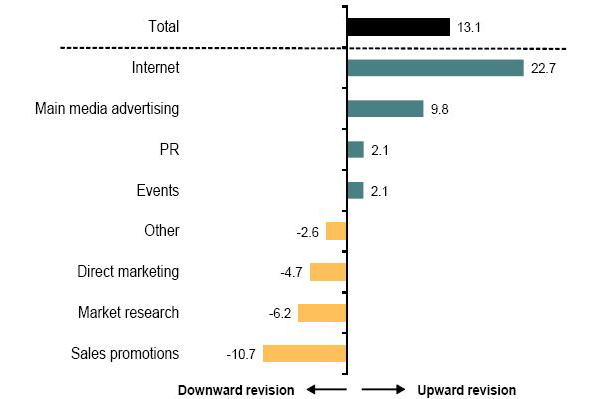
The IPA’s latest Bellwether report shows an expansion in marketers’ internet budgets to the highest growth rate in ten years, to +22.7%.
This has driven an overall increase in total UK marketing budgets being revised up to +13.1% for the second quarter of the year (from 11.8% last quarter).
However, the report revealed an upturn in uncertainty following the surprising outcome of last month’s General Election, combined with the unknown effect on economic activity of the Brexit negotiations.
Although 30% of the survey panel are more optimistic regarding their own financial prospects, over 20% have become less confident.
The resulting net balance of +9.8% was down from +13.9% in the preceding quarter and the lowest recorded by the survey since the end of 2012.
Internet budgets, meanwhile, have been upgraded to the highest growth rate in ten years to +22.7%.
This has driven an overall increase in total UK marketing budgets being revised up to +13.1% for the second quarter of the year (from 11.8% last quarter).
Within internet, search/SEO (+15.6%) and mobile (+3.0%) both continued to record upward revisions to growth. The increase in spending related to search/SEO was the highest recorded by the survey for two-and-a-half years.
Main media advertising is reporting softer growth quarter on quarter to 9.8% (down from 10.7%), as is events at 2.1% (down from 4.9%).
Rick Hirst, UK chief executive of Carat, told 北京赛车pk10 the report clearly suggested that marketers' focus had become much more short-term.
"The search for growth is pushing investment into channels that have the closest proximity to transaction and conversion, which is a potentially very addictive drug," Hirst said. "History shows that brands who weather difficult trading times best are those that hold their nerve and balance driving performance with investing ample time and energy into making customers love their brand for the long-term too."
Two categories – direct marketing and sales promotions – have seen a downgrading in budget, according to the survey.
Sales promotions saw the most dramatic fall in budget projections as marketers reported a -10.7% downgrading of budget, compared to last quarter when sales promotions’ budgets were fairly stable (+1.2%).
Meanwhile, direct marketing budgets have been revised down (-4.7%), having recorded growth in the previous quarter (+5.3%).
Joe Braithwaite, managing director at Proximity London, said the fall reflected an realignment of the traditional direct marketing budget into other areas that could broadly be called "customer engagement" today.
"Just like our clients, at Proximity we’re increasingly looking to break down the traditional siloes in search of the connected customer journey. The worlds of digital, social content, CRM and eCommerce are now more interwoven than ever and thus marketing budgets are aligning to reflect this," he added.

Despite overall growth, last month’s general election result which resulted in a minority government, combined with the unknown effect on economic activity of the Brexit negotiations, has helped bring about an upturn in pessimism. Although 30% of the survey panel are more optimistic regarding their own financial prospects, over 20% have become less confident.
The resulting net balance of +9.8% was down from +13.9% in the preceding quarter and the lowest recorded by the survey since the end of 2012.
Wider industry financial prospects turned increasingly negative. Over 26% of the survey panel signalled a reduction in optimism compared to three months ago when considering the financial prospects for their industry (14% indicated more confidence).
The resulting net balance of -12.6% compared to -5.7% in Q1 2017 and was the second lowest reading in four-and-a-half years (after Q4 2016’s -14.6%).
Paul Bainsfair, the IPA director general, said: "The election result has thrown further uncertainty into an already volatile environment.
"It is inevitable that this has had a knock-on effect on UK plc. Specifically for marketers this has meant a desire, where possible, to seek out more activation driven advertising.
"As evidenced strongly in this latest Bellwether report, this has resulted in a further move towards advertising in the digital space. While it is good to see spend up in internet, it is worth remembering that IPA studies have consistently shown that the most effective marketing results from a 60:40 brand building (emotional) to sales activation ratio (rational)."
With no update from the Office for Budget Responsibility since the previous Bellwether survey, the report’s annual adspend forecasts for the years through to 2020 are unchanged.
The report has been carried on a quarterly basis since 2000 and is drawn from a panel of around 300 UK marketing professionals.




.jpg)
.jpeg)
